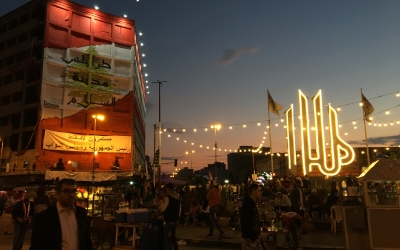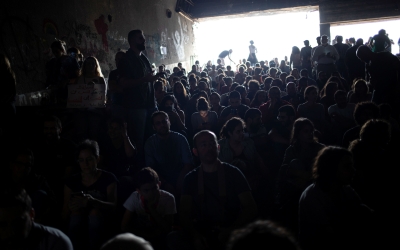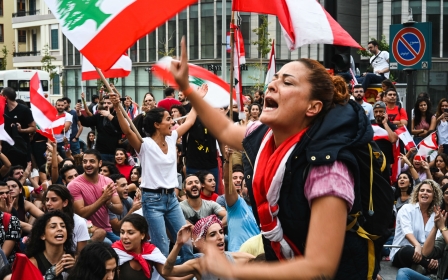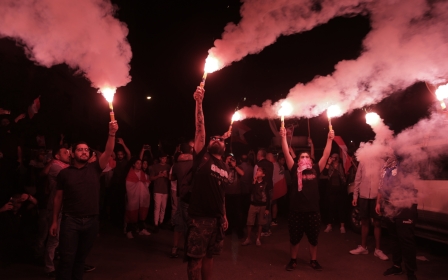Capital controls, devaluation, taxes: Can Lebanon find a way out of its economic impasse?
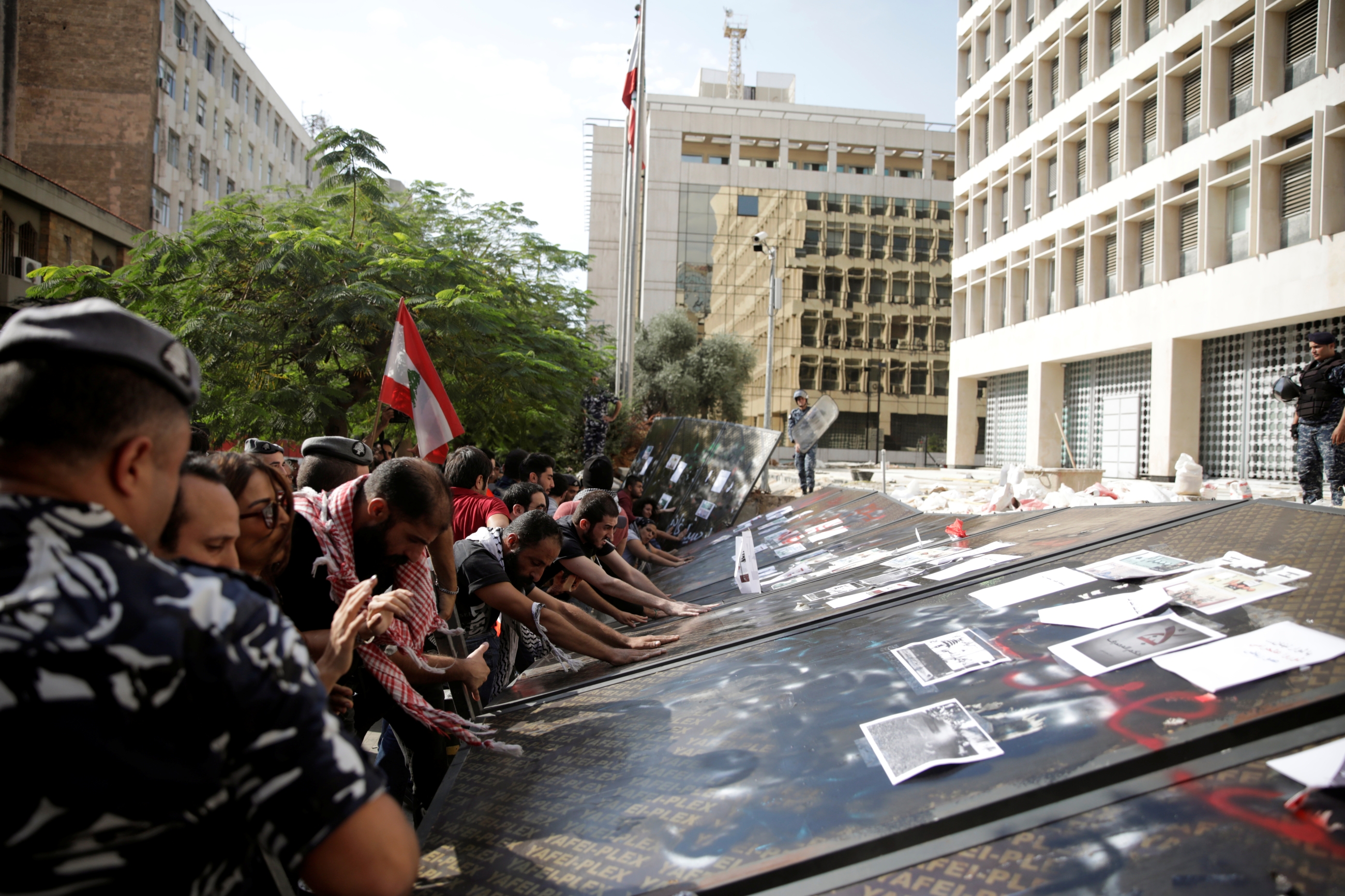
“Thief, thief, thief!” Protesters have been chanting outside the Lebanese central bank for the past three weeks, as mass unrest has raged across the country against corruption, economic hardship, and the political class demonstrators hold responsible for their plight.
“We barely have money left by the end of the month. We keep having to borrow money just to cover basic expenses,” said protestor Vlad Labban, a 43-year-old former employee at a food and beverage company now turned dog walker.
“People are going into their own modes of austerity, saving on anything they can.”
Lebanon is in its worst economic crisis since the 1975-1990 civil war. Government spending has for decades been encumbered by huge fiscal deficits that have amounted to one of the highest debt-to-GDP ratios in the world. The result today is debt-servicing costs that consume roughly half of public expenditure.
The causes? High-interest loans taken out to rebuild the country following the civil war that, due to compound interest, have ballooned to unsustainable levels. Widespread corruption and patronage networks have also fed off the public sector, while the state electricity company is woefully inefficient and heavily subsidised.
New MEE newsletter: Jerusalem Dispatch
Sign up to get the latest insights and analysis on Israel-Palestine, alongside Turkey Unpacked and other MEE newsletters
Lebanese analysts say there are possible ways out, but the country is short on time, with the potential outcomes of inaction devastating for everyday Lebanese.
'People are going into their own modes of austerity, saving on anything they can'
- Vlad Labban, protester
The government’s recent attempt to address this budget shortfall - including austerity measures and tax increases - have angered citizens already struggling to make ends meet and incited the nationwide protests.
The economic impasse comes after decades of commercial banks lending to the government to finance the debt. This lending, however, absorbed funds that could otherwise have been invested in the private sector, leading to a massive dependency on imports and an exodus of foreign currency to buy products from abroad.
Lebanon used to be able to depend on foreign investment to bring in that foreign currency. In recent years, however, confidence in the Lebanese economy has shrivelled, leading foreign investors to stop sending their money here. The result has been a shortage of foreign currency in the local market.
The rules of supply and demand have thus taken over: with less foreign currency in Lebanon and a relatively larger supply of local currency, there has been downward pressure on the value of the Lebanese lira.
Lebanese Central Bank (BdL) governor Riad Salameh on Monday once again ruled out a change in the country’s 22-year peg, which fixes the Lebanese pound at 1,507.5 to the dollar, saying that the bank had the capacity to preserve the stability of the currency.
At the same time, importers have found it increasingly difficult to buy foreign currency from Lebanese banks and have been forced to purchase dollars from money exchangers, whose valuation of the Lebanese currency is more pragmatic, with a more than 20 percent differential with the official exchange rate.
This has led the millers and petrol stations syndicates, among others, to stage periodic strikes, warning that the shortage of dollars was making it difficult for them to pay their suppliers. On Saturday, several petrol stations stopped pumping gas as they struggled to pay for shipment.
Devaluation: the good, the bad, and the ugly
Dan Azzi, Lebanese analyst and advanced leadership fellow at Harvard University, told Middle East Eye that in order to reduce the country's huge fiscal deficit - which the IMF has forecast will stand at 9.8 percent of GDP this year and 11.5 percent in 2020 - Lebanon must either lay off public sector employees, reduce their wages significantly, or devalue the currency.
"Once you rule out the first two due to public discontent, then you have no choice but to execute the latter," Azzi said.
Lebanon currently imports most of what it consumes, but if the value of the Lebanese pound drops, imports will become more expensive - therefore making domestic products more competitive on the market, which, in the long run, can result in the development of local industries.
'We have high poverty rate, with more than 30 percent of people living in poverty. If the lira devaluates, we will go up to a 60 percent poverty rate within a year'
- Jad Chaaban, economist
Fitch ratings agency director for EMEA sovereigns Toby Iles told Reuters on Friday that changing Lebanon’s currency peg to the dollar would be painful, but could also bring long-term benefits.
Meanwhile, Jad Chaaban, Lebanese economist and associate professor of economics at the American University of Beirut, warned that a devaluation would hit the country’s poorest first. If people lose their purchasing power, he said, it could lead to a civil strife.
“We have high poverty rate, with more than 30 percent of people living in poverty. If the lira devaluates, we will go up to a 60 percent poverty rate within a year,” Chaaban predicted. "Protecting purchasing powers should be a priority."
Lebanon suffers from a wide disparity of wealth, as the 1 percent richest people in the country own 58 percent of Lebanon’s wealth - while the poorest 50 percent own less than 1 percent, according to Lebanese newspaper Al-Akhbar.
Chaaban said measures must also include the monitoring of illegal increases in prices, through concerted efforts between the Ministry of Economy and judges to control the market and preserve the stability of the Lebanese pound.
Lebanese citizens have been recently complaining about an increase in the price of basic consumer goods such as milk and medicine, which are regulated by the state, with some traders raising the prices by up to 50 percent.
But first, Chaaban added, any newly appointed government must assign an emergency economic committee, in the form of working group of experts, to advise the government on capping the price of basic goods and fixing the currency exchange rate.
“Any new government has to make sure the central bank has enough dollars to intervene. Therefore, we cannot allow dollars to go out of the country,” he said.
“That means some type of control over the amount of dollars available in the system is needed.”
Capital controls
After a two-week closure, the banks in Lebanon reopened last Friday. While the central bank has promised not to introduce capital controls, there have been informal restrictions on customers’ ability to transfer funds abroad and to withdraw hard currency.
Capital control represents any measure taken by a government, central bank or other regulatory bodies to limit the flow of foreign capital in and out of the domestic economy.
Clients also faced limits on withdrawals from accounts in US dollars.
Azzi said capital controls - measures taken to limit the outflow of foreign capital - were one of the immediate measures that need to be undertaken by the central bank. He added that it was imperative that capital controls apply on the rich, and not be limited to the lower and middle classes.
“Capital controls across the board are needed. You can’t let off the rich while others bear the brunt. Banks have informally imposed capital controls, but it should also be a state decision.”
However, Salameh on Monday said that capital controls were not on the table because the country depends on the free movement of money, adding that the central bank had taken steps to safeguard deposits and that it had also asked banks to review their "conservative" steps.
Almost 75 percent of deposits held at Lebanese commercial banks are in dollars. Without capital controls, large withdrawals of foreign currency could leave the central bank with shortages in their reserves.
Azzi said one of Lebanon’s major issues is the balance of payments deficit, whereby the country is importing more goods, services and capital than it exports.
“We need to decrease the balance of payments deficits. Currently, many more dollars are leaving the country than coming in,” he said.
The issue could be addressed by a hike in tariffs on imported products, such as large cars and luxury goods – a measure that ought to decrease the country’s dependency on imports, thus helping to limit the outflow of foreign currency, according to Azzi.
“We can alter behaviour through taxation. Taxes on imported goods and travel for example would encourage local business, and direct the money internally,” he noted, adding that local tourism and technology are some of the areas that have potential for growth in Lebanon.
Colossal debt
A hike in taxes will be difficult to swallow for many Lebanese citizens, who were pushed to the streets when the government imposed in mid-October a daily $0.20 charge on calls made through online applications such as WhatsApp, a move they saw as a final straw in a long list of economic mismanagement.
But with Lebanon’s national debt at $86bn, equivalent to about 150 percent of GDP – the third highest debt-to -GDP ratio in the world – tax increases are most likely unavoidable.
'The moment you want to spend on something, 50 percent goes to the interest on debt'
- Jad Chaaban, Lebanese economist
The International Monetary Fund (IMF) warned in a report released on 17 October that Lebanon’s public debt was projected to increase to 155 percent of GDP by the end of 2019, making the country’s ability to repay its debts even harder than it already is.
Chaaban said the implementation of budget reforms should come first, not only to curb inefficient spending but to also contain debt servicing, for which the government spends 50 percent of its expenses on interests alone.
“The moment you want to spend on something, 50 percent goes to the interest on debt,” he said.
Azzi noted that the three main factors behind the massive debt are the deficit of the state-run power sector, Electricite du Liban (EdL), the interest on debt, and the fiscal deficit.
Two months before Prime Minister Saad Hariri's resignation under pressure from protests, the government introduced an emergency reforms package that included plans to accelerate a long-delayed reform of EdL, which drains $2 billion from the treasury annually – accounting for around 40 percent of Lebanon’s debt – while failing to deliver enough power for its citizens.
The measures have failed to persuade protesters to leave the streets or convince foreign donors to help cut next year’s budget deficit.
Chaaban said it is likely that Lebanon might be headed towards debt restructuring, which may entail an increased interest on future debt but would lower interest rate on current debt, thus decreasing the pressure on the government budget.
“The situation needs a planned solution. If we need to restructure, we should do it now and we commit to wider reforms down the road,” he said.
No time to waste
The reforms that Lebanon needs cannot take place with a caretaker government, and experts say there is no time to waste as the crisis will be deepen if no economic plan is put in place soon.
“The ball is in the state’s court. If they continue with a caretaker government, we will crash into a wall. Maybe not immediately but in a few months,” Chaaban said.
After Hariri’s resignation, the outgoing premier was appointed to head the caretaker government. But no clear signs have emerged regarding the shape of the future government, as protesters demand it undergoes a complete restructuring.
Azzi believes a real discussion is needed in the country, whereby the government discloses its shortcomings and real financial capabilities to the public.
“We need an honest conversation, and to recognise the fact that the government has spent all its money. We should not spend more than what we have,” Azzi said.
Compromise
Even as a dialogue between protesters and the state seems to be out of the question now, both sides will see the need for some form of compromise as the political stalemate persists, Karim Bitar, a professor of international relations in Paris and Beirut, told MEE.
“Given the huge economic pressure and financial crisis, we don’t have the luxury of time and everyone is aware of that so ultimately there will have to be a new government that can enact significant economic reforms,” he said.
So far, protesters have refused to negotiate and have deemed the resignation of the government as insufficient, demanding a complete overhaul of the political system, an independent transitional government, and an end to corruption and cronyism.
Bitar said the formation of a new government might take time due to what he says was an uncoordinated government resignation that took everyone by surprise, locally and internationally.
“The system has been weakened but the parties are digging in their heels, and they have significant grassroots support,” he said.
'For once, we all know what we really want and we’re going for the long-haul'
- Rasha Awada, protester
Bitar cautioned that neither the protesters nor the ruling parties will achieve their way completely, and the likely exit out of the political crisis is the formation of a government that combine figures from the existing system and new individuals representing the protest movement.
“It’s an illusion that this revolution would allow us to start from scratch with independent individuals,” he said.
“We’re still going have to deal with ruling parties, and they are not going to leave the scene so easily.”
For now, however, demonstrators are not willing to leave the streets as they reorganize their movement. Protesters have transitioned from roadblocks to targeting key state institutions and personalities they deem corrupt and inefficient.
In the past week alone, they have protested in front of the electricity company headquarters, the ministries of justice and education, telecom companies MTC and Alfa, the central bank, the places of residence of former prime minister Fouad Siniora and former minister of interior Nouhad al-Machnouk.
Standing outside the central bank, protester Rasha Awada, 29, spoke of a collective consciousness that is driving and shaping the protests.
“We’re not going to give in to [the government's] half-baked offers, and we will keep up the pressure by targeting the roots and people responsible for this mess,” she told MEE as people chanted “They are all a band of thieves” in the background.
“For once, we all know what we really want and we’re going for the long-haul.”
Middle East Eye delivers independent and unrivalled coverage and analysis of the Middle East, North Africa and beyond. To learn more about republishing this content and the associated fees, please fill out this form. More about MEE can be found here.


